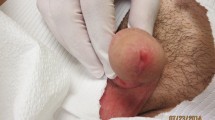Abstract
Silicones are widely used materials in many fields of medicine and largely are believed to be biologically inert. However, some investigators have reported that silicone implants are associated with an increased incidence of autoimmune disorders. In this study, we evaluated the capsular tissue of silicone implants and the sera of implant patients and controls for antisilicone antibodies and nonspecific immunoglobulins (IgG, IgA, IgM, and IgE). Our study group included 15 patients (eight men and seven women) undergoing reconstructive procedures for burn scars, in whom we used silicone implants, and 15 sex-matched controls undergoing reconstructive surgery for burn scars without using silicone implants. By immunofluorescence, we discovered strong capsular binding of IgG and weak capsular binding of IgM; antisilicone antibody levels were significantly higher in capsular tissue than elsewhere. Serum IgE also was higher in patient vs control subject sera. In conclusion, silicone materials do lead to an immune response consisting of antisilicone antibodies most evident immediately adjacent to the implant itself.

Similar content being viewed by others
References
Peters W (1995) Silicone breast implants and autoimmune connective tissue disease. Ann Plast Surg 34:103–109
Vojdani A, Brautbar N, Campbell AW (1994) Antibody to silicone and native macromolecules in women with silicone breast implants. Immunopharmacol Immunotoxicol 16:497–523
Yoshida SH, Chang CC, Teuber SS et al (1993) Silicon and silicone: theoretical and clinical implications of breast implants. Regul Toxicol Pharmacol 17:3–18
Pastor JC, Puenta B, Telleria J et al (2001) Antisilicone antibodies in patients with silicone implants for retinal detachment surgery. Ophthalmic Res 33:87–90
De Jong WH, Goldhoorn CA, Kallewaard M et al (2002) Study to determine the presence of antipolymer antibodies in a group of Dutch women with a silicone breast implant. Clin Exp Rheumatol 20:151–160
Wolf LE, Lappe M, Peterson RD, et al (1993) Human immune response to polydimethylsiloxane (silicone): screening studies in a breast implant population. FASEB J 7:1265–1268
Tenenbaum SA, Rice JC, Espinoza LR, et al (1997) Use of antipolymer antibody assay in recipients of silicone breast implants. Lancet 349:449–454
McCarty JG (ed) (1990) Esthetic breast surgery. In: Plastic surgery. Saunders, Philadelphia, pp 3886–3892
Goldblum RM, Pelley RP, O’Donell AA, et al (1992) Antibodies to silicone elastomers and reactions to ventriculoperitoneal shunts. Lancet 340:510–513
White KL Jr, Klykken PC (1998) The non-specific binding of immunoglobulins to silicone implant materials: the lack of a detectable silicone specific antibody. Immunol Invest 27:221–235
Evans GR, Slezak S, Rieters M et al (1994) Silicon tissue assays in nonaugmented cadaveric patients: is there a baseline level? Plast Reconstr Surg 93:1117–1122
Sergott TJ, Limoli JP, Baldwin CM et al (1986) Human adjuvant disease, possible autoimmune disease after silicone implantation: a review of the literature, case studies, and speculation for the future. Plast Reconstr Surg 78:104–114
Iannello S, Belfiore F (1998) Silicone breast prosthesis and rheumatoid arthritis: a new systemic disease: siliconosis. A case report and a critical review of the literature. Minerva Med 89:117–119
Karlson EW, Lee IM, Cook NR, et al (2001) Serologic evaluation of women exposed to breast implants. J Rheumatol 28:1523–1530
Teuber SS, Rowley MJ, Yoshida SH et al (1993) Anti-collagen autoantibodies are found in women with silicone breast implants. J Autoimmun 6:367–377
Karlson EW, Hankinson SE, Liang MH et al (1999) Association of silicone breast implants with immunologic abnormalities: a prospective study. Am J Med 106:11–19
Jensen B, Bliddal H, Kjoller K, et al (2001) Rheumatic manifestations in danish women with silicone breast implants. Clin Rheumatol 20:345–352
Peters W, Keystone E, Snow K, et al (1994) Is there a relationship between autoantibodies and silicone gel implants? Ann Plast Surg 32:1–5
Author information
Authors and Affiliations
Corresponding author
Rights and permissions
About this article
Cite this article
Bekerecioglu, M., Onat, A.M., Tercan, M. et al. The association between silicone implants and both antibodies and autoimmune diseases. Clin Rheumatol 27, 147–150 (2008). https://doi.org/10.1007/s10067-007-0659-1
Received:
Revised:
Accepted:
Published:
Issue Date:
DOI: https://doi.org/10.1007/s10067-007-0659-1




